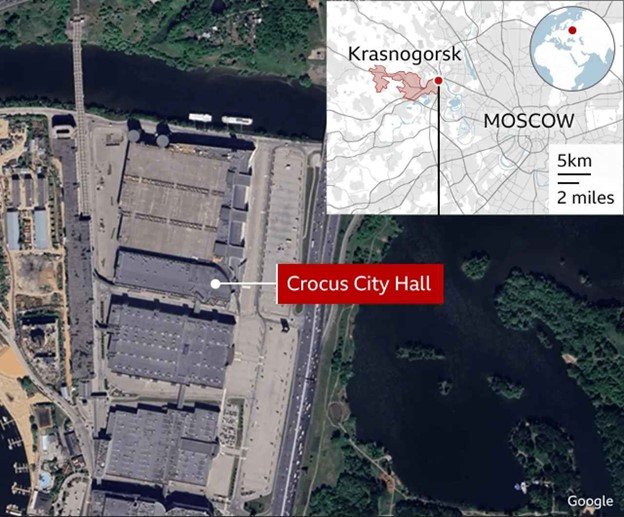Days later Vladimir Putin claimed a landslide fifth term victory in Russia’s presidential vote, and tragedy struck in the Moscow suburbs on Saturday, 23rd March 2024. The Russian authorities announced the arrests of four foreign nationals suspected of carrying out a devastating attack at a concert venue that left at least 133 people dead. Witnesses described a horrific scene as the assailants, clad in camouflage uniforms, opened fire and hurled explosives inside the packed venue, engulfing it in flames before the roof collapsed.
You Can Also Read: Moscow Shocked with At Least 133 Dead: ISIL Claims Responsibility
By Sunday morning, the once-lively concert hall had been reduced to a smoldering pile of rubble. The Islamic State was swift to claim responsibility for the carnage through multiple statements. Russian state media soon broadcast interrogation footage of at least two suspects, including one speaking in Tajik and another admitting to the killings after being recruited on the messaging app Telegram.
U.S. officials attributed the atrocity to the Islamic State’s Khorasan branch, active in Pakistan, Afghanistan, and Iran. “ISIS is a common terrorist enemy that must be defeated everywhere,” White House Press Secretary Karine Jean-Pierre stated grimly. Secretary of State Antony J. Blinken condemned the assault, saying America “stands in solidarity with the Russian people grieving this immense loss of life.” Similar statements of solidarity have followed from across the world.

The attack summoned haunting memories of ISIS claiming the 2015 downing of a Russian jet departing Egypt’s Sharm El-Sheikh resort, and the 2017 St. Petersburg metro bombing by an Al-Qaeda-linked cell. Notably, just weeks prior, the U.S. Embassy in Moscow had issued a public warning urging avoidance of large gatherings like concerts due to intelligence about imminent extremist attack plots in the capital – intelligence that American officials had also privately shared with their Russian counterparts. According to one expert, amplifying propaganda before such high-profile attacks against adversaries like Russia is a hallmark ISIS tactic meant to bolster credibility, funding, and recruitment efforts.
Possible Motives
“I think their ideology inspires them in terms of selecting targets. First of all, Russia is in Syria and fighting against Daesh [ISIL] like the United States. That means they see such countries as hostile,” Murat Aslan, Military Analyst and Former Colonel, Turkish Army.
Over just the past month, Russian authorities claim to have disrupted several other Islamic State-related incidents across the country. At least four cases in March involved individuals with alleged ISIS ties, including a purported plot by the group to attack a Moscow synagogue that was thwarted by Russia’s Federal Security Service.
Defense analysts like Amira Jadoon and Michael Kugelman say ISIS has increasingly directed vitriolic propaganda at President Vladimir V. Putin over claims of oppressing Muslims, citing Russia’s invasion of Afghanistan, actions in Chechnya, alliances with Syria and Iran, and military campaigns against the group in Syria as well as African nations via Russian mercenaries such as Wagner.
“Russian foreign policy has been one big red flag for ISIS,” said Michael Kugelman of the Wilson Center think tank. This has made Moscow a prime focus of the group’s “extensive propaganda war,” according to Amira Jadoon, assistant professor at Clemson University in South Carolina and co-author of, The Islamic State in Afghanistan and Pakistan: Strategic Alliances and Rivalries, ISIS views Russia as “a key adversary” for fighting the group and aligning with the rival Taliban in Afghanistan.
Should Russia definitively attribute the concert attack to ISIS’s Khorasan branch, analysts like Jadoon believe the group hopes to boost its global standing by demonstrating a terrifying ability to strike within Russian territory itself.
Other experts assert Russia is viewed by ISIS as “a crusading power against Muslims,” with the Taliban factor motivating the Khorasan branch to retaliate against Putin as a key ally of their bitter rival in Afghanistan.
Conclusion
The deadly concert assault, whether definitively linked to ISIS or not, has laid bare the rising terrorist threat Russia faces within its own borders from Islamic extremist groups. As it confronts potential future plots and propaganda from ISIS’s regional affiliates, Moscow may find itself increasingly targeted by the militants as a major adversary in their quest for global relevance and retaliation over Russia’s policy stances across the Muslim world.


